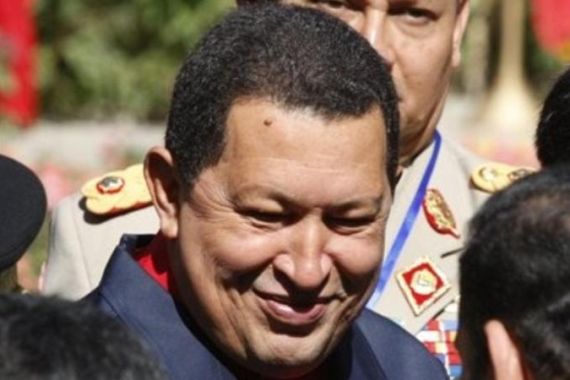Obituary: Hugo Chavez
Hugo Chavez, Venezuela’s populist president, dies in a Caracas hospital after a nearly two-year battle with cancer.

Hugo Chavez, Venezuela’s populist president, has died in a Caracas hospital after a nearly two-year battle with cancer.
Chavez had checked into the hospital on February 18 for a course of chemotherapy after spending two months in Cuba, where in December he had undergone his fourth round of cancer surgery since June 2011.
Born on July 28, 1954 in a rural town called Sabaneta, Chavez was the son of school teachers.
At the age of 17, he went to the Venezuelan Academy of Military Sciences in the capital and served as an army officer.
He always dreamed of being a baseball player in his youth. However, while in the city, he rapidly acquired a taste for life in the military service.
“By the time I dressed in blue for the first time, I already felt like a soldier,” he once said, according to his biographers Christina Marcano and Alberto Barrera, who penned the book Hugo Chavez Without Uniform.
When he finished his studies in 1975, Chavez was deployed to the jungle to fight against lefitst rebels.
Unhappy with what he saw during the fighting, including the use of torture, Chavez decided to secretly found the Bolivarian Revolutionary Movement with a group of other disgruntled military officers – named in honour of Venezuelan independence hero Simon Bolivar.
In 1992, Chavez led a failed coup that ended in the deaths of 18 people and left 16 injured. He was pardoned in 1994 by then-president Rafael Caldera.
The road to power
After his release, Chavez jumped head-first into politics, railing against the country’s traditional elite and promising to improve the lives of the poor.
| In Depth | |||||||||||
|
With a commanding 56 percent, Hugo Chavez was first elected president of Venezuela in December 1998.
In an interview that year, he declared that Cuba was a dictatorship, that he didn not have plans for nationalising the media, and that he supported increased private investment in the country.
“He is reinventing himself all the time,” Alberto Barrera, co-author of the 2007 biography Hugo Chavez, told Al Jazeera.
“One day he considers himself a Marxist, the other day a fervent Catholic. It is very difficult to know in reality who he was.”
Tackling poverty
When Chavez began his first mandate, his combative style and charisma served him well in a country marked by strong discontent.
Between his reforms, Chavez promoted the establishment of social missions.
The missions aimed to provide large-scale assistance grants for education and housing to help poor communities, leverging oil revenue for social programmes.
Poverty dropped by 30 per cent between 1995 and 2005, according to the World Bank, while extreme poverty dropped from 32 per cent to 19 per cent.
Chavez managed to put the issue of poverty in the centre of the national debate. According to analysts, one of his biggest legacies was empowering the poor and the excluded in the country.
In 2002, Hugo Chavez faced one of the biggest crises in his political career. A strike at PDVSA, the national oil company, led to a coup attempt and Chavez was taken prisoner in the presidential palace.
Pedro Carmona, a prominent businessman and coup leader, declared that Chavez had resigned. Lasting 48 hours, the coup was defeated and Chavez was reinstated.
“Before [the coup attempt], he didn’t say he was from right or left,” Barrera told Al Jazeera. Chavez has been “radicalised since 2002”.
‘Socialist republic’
In August 2004, Chavez won a referendum in which Venezuelans were asked whether he should serve out the remaining two years of his term, increasing his confidence and desire for major changes to the country’s economy.
He signed a decree on land reform in 2005 which aimed to eliminate large estate, believing land redistribution would bring social justice to poor people.
In the same year, Venezuela and 13 Caribbean states launched a regional oil company at a summit in Caracas where Chavez agreed to supply the nations with cheap fuel.
|
“He believed he was called to do something gigantic, he believed he was called to save the planet “ – Alberto Barrera co-author of the 2007 biography Hugo Chavez |
Critics accused him of using oil to increase diplomatic influence.
In 2006, Chavez won a third term as president with 63 percent of the vote.
Later, in 2007, he announced that the government would take control of oil projects in Orinoco, and that key energy and telecommunications companies were to be nationalised.
Chavez also announced plans to consolidate Venezuela as a “socialist republic”.
He envisioned “Bolivarian Socialism” as an alternative to what he called “destructive and savage capitalism”.
By 2019, Chavez aimed to have 90 percent of Venezuela’s food locally produced, and 68 percent of the citizens living on communes.
In terms of foreign policy, he allied himself with the major adversaries of the US, including Iran and Syria, while putting special emphasis on South American unity.
During Chavez’s rule, Venezuela took a more active role in the Organisation of Petroleum Exporting Countries, pushing the organisation to take a hawkish line on oil prices.
Venezuela played a key role in pushing global oil prices from around $10 a barrel in 1998, to more than $20 per barrel in the early part of the 21st century, according to a study by Ronald Sylvia.
Diplomatically, Chavez became part of a regional push for Latin American integration, framing commercial deals as part of a battle against US “hegemony”.
He often attempted to portray himself as a leading international defender of the poor and the weak against the powerful.
“He believed he was called to do something gigantic,” Barrera said. “He believed he was called to save the planet.”